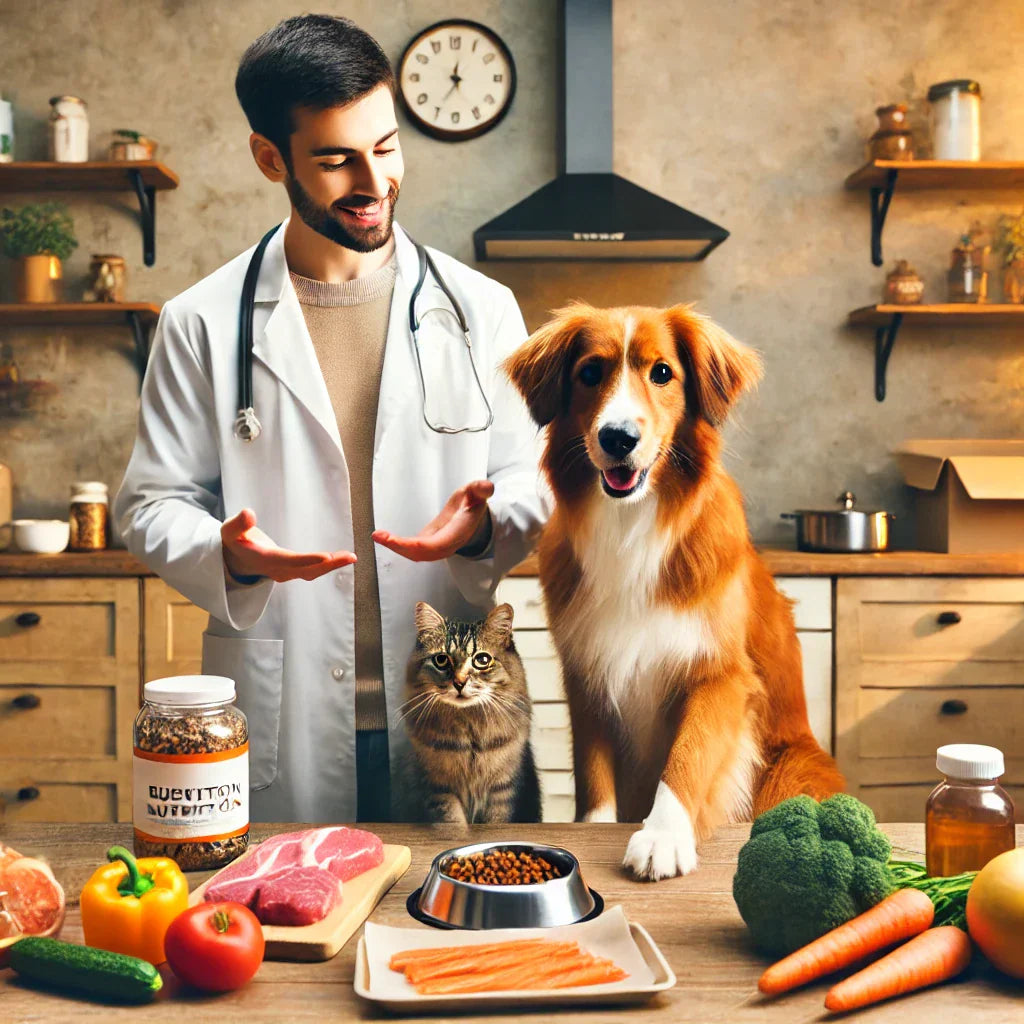
The Role of Nutrition in Saving Pets' Lives
Share

Introduction: Why Pet Nutrition is Critical for Longevity
A pet’s diet is the foundation of their health, energy levels, and longevity. A well-balanced diet helps prevent obesity, heart disease, diabetes, and digestive issues, while poor nutrition can lead to weakened immunity and chronic illnesses.
This guide will explore:
✅ Essential pet nutrients for survival and optimal health
✅ How diet impacts pet longevity and disease prevention
✅ Common dietary mistakes pet owners make
✅ How to choose the best pet food for health and survival
🐾 Identify distress signals early to prevent serious health issues—good nutrition helps pets resist disease and recover faster.
1. Essential Nutrients for Pets: What They Need to Thrive
📌 What Nutrients Are Essential for Pet Survival?
A pet’s diet must contain balanced macronutrients (proteins, fats, carbohydrates) and vital micronutrients (vitamins, minerals, and water) to support overall well-being.
Key Nutrients & Their Importance:
✔ Protein – Crucial for muscle growth, immune support, and tissue repair.
✔ Fats – Provide energy, support brain health, and maintain a shiny coat.
✔ Carbohydrates – Aid digestion and provide fiber for gut health.
✔ Vitamins & Minerals – Essential for metabolism, immunity, and bone strength.
✔ Water – Regulates body temperature, aids digestion, and prevents dehydration.
🐾 Pair vaccinations with proper nutrition for optimal pet health—a strong immune system starts with the right diet.
2. The Impact of Nutrition on Pet Longevity
📌 How Does a Balanced Diet Improve Pet Longevity?
🚨 Poor nutrition can lead to:
❌ Weakened immunity → More frequent illnesses.
❌ Joint issues & obesity → Reduced mobility and pain.
❌ Digestive problems → Nutrient deficiencies and organ damage.
📌 A Well-Balanced Diet Can:
✔ Prevent common diseases like diabetes, kidney failure, and arthritis.
✔ Improve energy levels and cognitive function in aging pets.
✔ Enhance skin and coat health, reducing allergies and irritations.
🐾 Catch illnesses early with these warning signs—nutritional deficiencies can lead to serious health problems.
3. Nutritional Requirements for Dogs and Cats
📌 What Do Dogs and Cats Need for a Balanced Diet?
Canine Nutrition:
✔ High-quality protein (chicken, fish, beef) for muscle and immune support.
✔ Healthy fats (omega-3s) for brain health and joint support.
✔ Fiber & digestible carbohydrates for gut health.
Feline Nutrition:
✔ Taurine – An essential amino acid for heart and eye health.
✔ High-protein diet – Cats are obligate carnivores and require animal-based protein.
✔ Hydration – Cats naturally consume less water, making wet food beneficial.
🐾 Complement vaccines with natural remedies for minor ailments—proper diet can support recovery and reduce vet visits.
4. The Role of Vitamins and Minerals in Pet Health
📌 Why Are Vitamins & Minerals Essential?
✔ Vitamin A – Supports eye health and immune function.
✔ Vitamin D – Essential for calcium absorption and bone health.
✔ Calcium & Phosphorus – Crucial for strong bones and teeth.
✔ Zinc & Iron – Promote healthy skin and oxygen transport.
What Happens If Pets Lack These Nutrients?
❌ Brittle bones, joint pain, and weakness.
❌ Skin infections, dull fur, and hair loss.
❌ Weakened immune system leading to frequent infections.
🐾 Don’t forget about senior pets—here’s how to care for them—older pets need adjusted nutrition to stay healthy.
5. Common Nutritional Mistakes Pet Owners Make
📌 Avoid These Pet Nutrition Mistakes:
❌ Feeding human food – Many foods, like onions and chocolate, are toxic to pets.
❌ Skipping essential nutrients – Homemade diets may lack key vitamins.
❌ Overfeeding treats – Leads to obesity and diabetes.
❌ Feeding the wrong diet for age or breed – Puppies, seniors, and large breeds have unique nutritional needs.
🐾 Take steps to prevent serious infections with early detection—a proper diet reduces the risk of long-term health problems.
6. Choosing the Best Pet Food for Health & Survival
📌 Evaluating Pet Food for Nutritional Value
🔎 How to Read Pet Food Labels:
✔ Look for named animal proteins as the first ingredient.
✔ Avoid fillers like corn, soy, and artificial preservatives.
✔ Check for essential fatty acids, vitamins, and minerals.
📌 Best Feeding Practices:
✔ Use high-quality commercial pet food with veterinarian approval.
✔ If choosing homemade food, consult a vet for proper supplementation.
✔ Maintain a consistent feeding schedule to prevent digestion issues.
🐾 Ensure your home is a safe space for your pet—proper diet complements overall pet safety.
7. Water: The Most Overlooked Nutrient for Pet Survival
📌 Why Is Water Intake Crucial for Pets?
✔ Regulates body temperature and prevents overheating.
✔ Aids in digestion and nutrient absorption.
✔ Flushes toxins from the body, preventing kidney disease.
📌 How Much Water Should Pets Drink Daily?
✔ Dogs: 1 oz of water per pound of body weight.
✔ Cats: Prefer fresh water sources—consider a pet fountain.
🐾 Identify distress signals early to prevent serious health issues—dehydration can be deadly if not treated.
